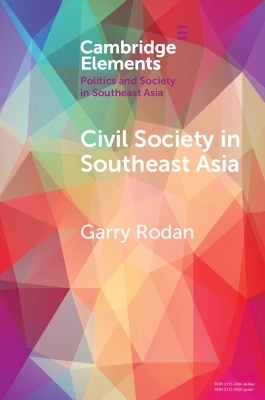
Civil Society in Southeast Asia
Power Struggles and Political Regimes
Seiten
2022
Cambridge University Press (Verlag)
978-1-108-70742-8 (ISBN)
Cambridge University Press (Verlag)
978-1-108-70742-8 (ISBN)
Explaining the power struggles over relationships between civil society and the state, the approach in this Element emphasises the historical and political economy foundations shaping conflicts, interests and coalitions that mobilise through civil society.
Contrary to popular claims, civil society is not generally shrinking in Southeast Asia. It is transforming, resulting in important shifts in the influences that can be exerted through it. Political and ideological differences in Southeast Asia have sharpened as anti-democratic and anti-liberal social forces compete with democratic and liberal elements in civil society. These are neither contests between civil and uncivil society nor a tussle between civil society and state power. They are power struggles over relationships between civil society and the state. Explaining these struggles, the approach in this Element emphasises the historical and political economy foundations shaping conflicts, interests and coalitions that mobilise through civil society. Different ways that capitalism is organised, controlled, and developed are shown to matter for when, how and in what direction conflicts in civil society emerge and coalitions form. This argument is demonstrated through comparisons of Singapore, Malaysia, the Philippines, and Thailand.
Contrary to popular claims, civil society is not generally shrinking in Southeast Asia. It is transforming, resulting in important shifts in the influences that can be exerted through it. Political and ideological differences in Southeast Asia have sharpened as anti-democratic and anti-liberal social forces compete with democratic and liberal elements in civil society. These are neither contests between civil and uncivil society nor a tussle between civil society and state power. They are power struggles over relationships between civil society and the state. Explaining these struggles, the approach in this Element emphasises the historical and political economy foundations shaping conflicts, interests and coalitions that mobilise through civil society. Different ways that capitalism is organised, controlled, and developed are shown to matter for when, how and in what direction conflicts in civil society emerge and coalitions form. This argument is demonstrated through comparisons of Singapore, Malaysia, the Philippines, and Thailand.
1. Theorising civil society; 2. Technocratic state capitalism and civil society timidity in Singapore; 3. Crony capitalism, race and civil society coalitions in Malaysia; 4. Private oligarchy, civil society and populism in the Philippines; 5. Capital, monarchy and military: Thailand's polarised civil society; 6. Conclusion; References.
| Erscheinungsdatum | 12.10.2022 |
|---|---|
| Reihe/Serie | Elements in Politics and Society in Southeast Asia |
| Zusatzinfo | Worked examples or Exercises |
| Verlagsort | Cambridge |
| Sprache | englisch |
| Maße | 152 x 228 mm |
| Gewicht | 150 g |
| Themenwelt | Sozialwissenschaften ► Politik / Verwaltung ► Staat / Verwaltung |
| ISBN-10 | 1-108-70742-4 / 1108707424 |
| ISBN-13 | 978-1-108-70742-8 / 9781108707428 |
| Zustand | Neuware |
| Informationen gemäß Produktsicherheitsverordnung (GPSR) | |
| Haben Sie eine Frage zum Produkt? |
Mehr entdecken
aus dem Bereich
aus dem Bereich
Organisationen steuern, Strukturen schaffen, Prozesse gestalten
Buch | Softcover (2024)
Rehm Verlag
CHF 53,20


